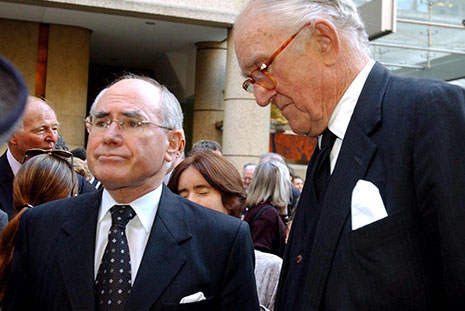“NO COMMENTATORS, no academics, no spin.” That was one of the catch-cries of the ABC’s ubiquitous promotions for The Howard Years, which finished screening this week. While one person’s spin might be another’s reality, surely few who watched the four-part series believe it lived up to that piece of marketing hype.
Led by John Howard (whose participation was conditional on the exclusion of commentators and academics) the former government members interviewed for the series followed one fundamental instinct: to put the best possible construction on their actions and counter the idea that they might have erred during critical moments of the Coalition’s lengthy reign. Indeed, ironically, the programs reminded viewers of the preferred spin techniques of different members of the Howard ministry. Thus, for example, we had the pained insistences of a desiccated-looking Phillip Ruddock, the comically transparent dissembling of Peter Reith, and the letter-perfect, plausible deniability of Howard.
While providing a useful narrative of the political events of 1996–2007, the series was confirmatory rather than revelatory. There was further evidence of Howard’s unhealthy dominance and propensity for unilateral (or bilateral) rather than collective decision-making on key issues such as East Timor and the GST. The series also highlighted how quickly tensions surfaced between Howard and Peter Costello and how the two men’s rivalry smouldered away throughout the Coalition’s four terms.
Should we have expected more? The program was modelled on the 1993 series, Labor in Power series. What distinguished that series was the fact that it was filmed while the Keating government was still in office, but at a stage when the Labor ministers and other players interviewed assumed the government was electorally doomed. Instead, aided by an anti-GST scare campaign, Keating was returned in March 1993, meaning that the series become that most peculiar thing: a post-mortem on a living, breathing government. This endowed it with a salience missing from The Howard Years.
The broader problem with a series like this one is that self-reflection and self-criticism rarely feature prominently in the psychological repertoires of politicians, especially those who rise to positions of leadership. Adamantine self-justification built on steely inner conviction is more characteristic of power personalities. We shouldn’t be too harsh on them for this: too much introspection is most likely a formula for paralysis in a government leader.
Yet Howard was perhaps an extreme example of the conviction leader. Whether because he had been vulcanised by so many years in the cauldron of politics or desensitised by the rigours of continual decision-making, his capacity for self-doubt appeared to atrophy the longer he remained in office. Just in case we hadn’t noticed he took to ad nauseam declarations that, though we might not agree with him, we knew what he stood for. Nothing else much mattered. He was a leader inhabiting an existential free zone. And it was this same closed-minded, buttoned-up Howard that turned up for the filming of The Howard Years.
To be fair to Howard, it’s true that the resolute record-defending on display in The Howard Years has become one of the habitual preoccupation of modern ex-PMs. It seems to be a coping mechanism for post-prime ministerial life. Memoirs have become a particularly common means of defending records. The trend to self-justification began with John Gorton, who within months of losing office wrote a series of newspaper articles vaingloriously titled “I Did It My Way.” The hapless William McMahon hawked his memoirs to publishers, but without success; according to one account, McMahon’s “highly tendentious” manuscript provoked “universal scepticism, if not sheer disbelief.”
It is Gough Whitlam, however, who set the benchmark for post-prime ministerial self-justification with a painstakingly comprehensive 700 plus page inventory of the policy-making record of his government. Almost matching the size of Whitlam’s tome, Bob Hawke released his memoirs in 1994 to hostile reaction. Hawke was criticised for its vindictive attitude to Keating, the man who had prised the prime ministership from him in 1991, and the self-aggrandising in the book was taken as confirmation of the author’s narcissism.
Keating has not written memoirs, but he has devoted much of his energy since his political demise to claiming and reclaiming credit for the reforms of the 1980s and much else besides. Contrition for his misjudgements, on the other hand, has been not so much sotto voce as non-existent. Malcolm Fraser, while previously expressing scepticism about autobiographies because they too frequently amount to “self-justification,” is now working on his memoirs with the assistance of one of Australia’s most accomplished journalists. Howard has already flagged plans to write his memoirs.
What all this tells us is that we ought not to have been surprised that The Howard Years, despite the publicity claims, effectively became an exercise in self-justification and record-defending. This doesn’t mean it lacked merit. Indeed, it’s healthy that former prime ministers and ministers place their version of events on the historical record.
At the same time, it should give us cause for scepticism when some future chronicler, whether the ABC or otherwise, trumpets the virtues of an account of government unencumbered by “commentators or academics,” in which only those “in the room, the players” are privileged with a voice. For “the players,” more so than anyone else, have an investment in retailing at best a partial truth. •




